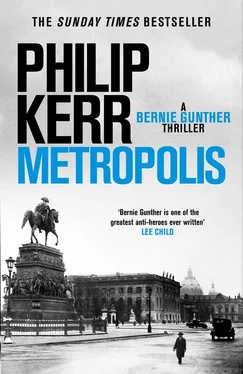Bernhard Weiss told me the comparison was and always had been nonsense, that it was like comparing apples with oranges. He didn’t believe in evil and reminded me that there were no laws against it anywhere, not even in England, where there were laws against almost everything. In May 1928, the famous Ishtar Gate, the northern entrance to Babylon, had yet to be reconstructed in Berlin’s Pergamon Museum, so the Prussian capital’s notoriety as the wickedest place in the world had yet to be underlined in red by the city’s moral guardians, meaning there was still some room for doubt. Perhaps we were just more honest about our own depravities and more tolerant of other people’s vices. And I should know; in 1928, vice in all its endless permutations was my departmental responsibility at the Police Praesidium on Berlin’s Alexanderplatz. Criminalistically speaking — which was a new word for us cops, thanks to Weiss — I knew almost as much about the subject of vice as Gilles de Rais. But in truth, with so many dead in the Great War and the flu that came immediately after, which, like some Old Testament plague, killed millions more, it hardly seemed important to worry about what people put up their noses or what they did when they got undressed in their dark Biedermeier bedrooms. And not just in their bedrooms. On summer nights, the Tiergarten sometimes looked like a stud farm, there were so many whores copulating on the grass with their clients. I suppose it’s hardly surprising that after a war in which so many Germans were obliged to kill for their country, they now preferred to fuck.
Given everything that went before and everything that followed, it’s difficult to speak accurately or fairly about Berlin. In many ways it was never a pleasant place and sometimes a senseless, ugly one. Too cold in winter, too hot in summer, too dirty, too smoky, too smelly, too loud, and, of course, afflicted horribly with far too many people, like Babel, which is the other name for Babylon. All the city’s public buildings were constructed to the glory of a German empire that hardly ever existed and, like the city’s worst slums and tenements, made nearly everyone who encountered them feel inhuman and insignificant. Not that anyone ever cared much about Berlin’s people (certainly its rulers didn’t) since they were not very agreeable, or friendly, or well mannered; quite often they were stupid, heavy, dull and relentlessly vulgar; always they were cruel and brutal. Violent murders were commonplace; mostly these were committed by drunken men who came home from the beer house and strangled their wives because they were so befuddled by beer and schnapps they didn’t know what they were doing. But sometimes, it was something much worse: a Fritz Haarmann or a Karl Denke, one of those peculiar, godless Germans who seemed to enjoy killing for its own sake. Even this no longer seemed so surprising; in Weimar Germany there was perhaps an indifference to sudden death and human suffering that was also an inevitable legacy of the Great War. Our two million dead was as many as Britain and France combined. There are fields in Flanders that contain the bones of so many of our young men that they are more German than Unter den Linden. And even today, ten years after the war, the streets are always full of the maimed and the lame, many of them still in uniform, begging for a few coins outside railway stations and banks. It’s a rare day when Berlin’s public spaces don’t resemble a painting by Pieter Brueghel.
And yet, for all that, Berlin was also a wonderful, inspiring place. Despite the many previously listed reasons to dislike the city, it was a large, bright mirror to the world and hence, for anyone interested in living in that world, a marvellous reflection of human life in all its fascinating glory. I wouldn’t have lived anywhere else but Berlin if you’d paid me, especially now that Germany was over the worst. After the Great War, the flu and the inflation, things were getting better, albeit slowly; things were still hard for a lot of people, in the east of the city most of all. But it was difficult to see Berlin ever going the same way as Babylon, which, according to the Conversations-Lexicon , was destroyed by the Chaldeans, its walls, temples and palaces razed and the rubble thrown into the sea. Something like that was never going to happen to us. Whatever followed now, we were probably safe from a biblical destruction. It wasn’t in anyone’s interest — not the French, nor the British, and certainly not the Russians — to see Berlin and, by extension, Germany, become the subject of divine apocalyptic vengeance.
Everywhere the mystery of the corpse.
— Max Beckmann, Self-Portrait in Words
Five days after the federal general election, Bernhard Weiss, Berlin’s chief of the Criminal Police, summoned me to a meeting in his sixth-floor office at the Alex. Wreathed in the smoke from one of his favourite Black Wisdom cigars and seated at the conference table alongside Ernst Gennat, one of his best homicide detectives, he invited me to sit down. Weiss was forty-eight years old and a Berliner, small, slim and dapper, academic even, with round glasses and a neat, well-trimmed moustache. He was also a lawyer and a Jew, which made him unpopular with many of our colleagues, and he’d overcome a great deal of prejudice to get where he was: in peacetime, Jews had been forbidden to become officers in the Prussian Army; but when war broke out, Weiss applied to join the Royal Bavarian Army, where he quickly rose to the rank of captain and won an Iron Cross. After the war, at the request of the Ministry of the Interior, he’d reformed the Berlin police and made it one of the most modern forces in Europe. Still, it had to be said, he made an unlikely-looking policeman; he always reminded me a little of Toulouse-Lautrec.
There was a file open in front of him and from the look of it, the subject was me.
‘You’ve been doing a good job in Vice,’ he said in his plummy, almost thespian voice. ‘Although I fear you’re fighting a losing battle against prostitution in this city. All these war widows and Russian refugees make a living as best they can. I keep telling our leaders that if we did more to support equal pay for women we could solve the problem of prostitution in Berlin overnight.
‘But that’s not why you’re here. I expect you’ve heard: Heinrich Lindner has left the force to become an air traffic controller at Tempelhof, which leaves a spare seat in the murder wagon.’
‘Yes, sir.’
‘Do you know why he left?’
I did know, but hardly wanting to say, I found myself pulling a face.
‘You can say. I shan’t be in the least offended.’
‘I’d heard it said he didn’t like taking orders from a Jew, sir.’
‘That’s correct, Gunther. He didn’t like taking orders from a Jew.’ Weiss drew on his cigar. ‘What about you? Do you have any problems taking orders from a Jew?’
‘No, sir.’
‘Or in taking orders from anyone else, for that matter.’
‘No, sir. I have no problem with authority.’
‘I’m delighted to hear it. Because we’re thinking of offering you a permanent seat in the wagon. Lindner’s seat.’
‘Me, sir?’
‘You sound surprised.’
‘Only that it’s the splash around the Alex that Inspector Reichenbach was going to get the seat.’
‘Not unless you turn it down. And even then I have my doubts about that man. Of course, people will say I don’t dare offer the seat to another Jew. But that’s not it at all. In our opinion you’ve the makings of a fine detective, Gunther. You are diligent and you know when to keep your mouth shut; that’s good in a detective. Very good. Kurt Reichenbach is a good detective, too, but he’s rather free with his fists. When he was still in uniform, some of his brother police officers nicknamed him Siegfried, on account of the fact that he was much too fond of wielding his sword. Of hitting some of our customers with the handle or the flat of the blade. I don’t mind what an officer does in the name of self-defence. But I won’t have a police officer cracking heads open for the pleasure of it. No matter whose head it is.’
Читать дальше












